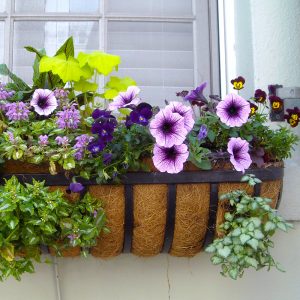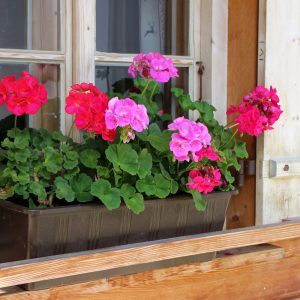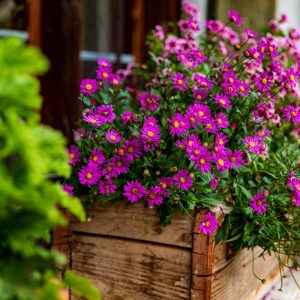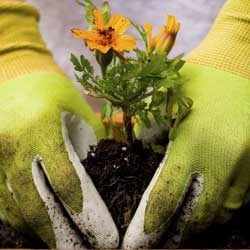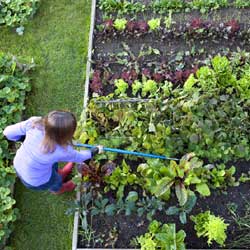Window boxes can provide plentiful gardening space in the city, even without a yard. Whether you live in an apartment, condominium, or row house, you can add window boxes for extra gardening, and with proper care, your window boxes can yield a delicious harvest, fragrant herbs, or stunning flowers for you to enjoy.
About Windowboxes
Windowboxes aren’t just for windows, and there are many different shapes and designs to choose from. Over-the-railing boxes are ideal for decks and balconies, and wall-hanging boxes can make use of any vertical space. These versatile containers are available in different sizes, from small, compact containers to much deeper, larger options for even bigger vegetables and multiple plants.
Wood is the traditional material for window boxes and is still a favorite choice for many spaces. Plastic and resin models are also available and can be lighter weight, and metal frames with moss or coir liners are attractive rustic options. You can even get creative with windowboxes and choose non-traditional styles, such as repurposing garden boots, apron pockets, tin pails, or other fun containers to make a windowbox that suits your space and style.
While decorative flowers remain a popular favorite for window boxes, you can grow anything you like in these containers. An herb garden is ideal for these small spaces, or you can choose miniature versions of all your favorite vegetables and fruits. Mix plants up for a diverse windowbox, and use taller plants, such as climbing vines or grasses, to add more height, while trailing plants such as creepers and dangling vines can spill out of the space for more drama.
Best Windowbox Care
No matter what you plant in your window box, you will want to give it the proper care for excellent growth and the most vibrant plants.
- Mount the box securely.
Use the proper fasteners to mount your window box, and take into account its full weight as plants grow. Freshly watered, damp soil will be heavier, and the box needs to be secure to hold that weight. If you are placing the box on a railing, be sure the railing is sturdy and the box is not tipped or angled unsafely. - Choose appropriate plants for the space.
Consider the sunlight your box will get when choosing which plants to grow in the space. The sun will shift throughout the season, and you want to be sure your plants have the levels of sunlight they require for their best growth. Also be sure the box provides enough depth for adequate root growth so the plants will be their healthiest, and be aware that windowboxes may be subject to extra heat reflecting off glass or walls, so heat-tolerant plants are always a good choice. - Use high-quality, moisture-retaining soil.
Windowboxes need good quality potting soil to nurture plants, and which soil you choose will depend on whether you are growing vegetables, flowers, succulents, or herbs. Soil mixes with moisture-retaining granules are a great choice for window boxes and will help keep the plants watered so they stay lush, beautiful, and productive. - Water the box properly.
Windowboxes can dry out more quickly than traditional garden spaces and may need to be watered daily or even more than once a day depending on the box size, how the soil retains moisture and the watering needs of your plants. A watering wand can help you reach windowboxes in more difficult places, or consider adding water globes to the box for a practical splash of color that will keep your plants watered. - Choose slow-release fertilizers for extra nourishment.
A slow-release, liquid fertilizer is a great option for window boxes and will help provide all the nutrition your plants need. Choose a fertilizer blend that suits your plants’ requirements, and apply it once a week or at whatever rate is recommended for your box size and type of plants. - Groom your windowboxes regularly.
Because windowboxes are such a small space, it can be easy to keep them looking their best with regular deadheading and other maintenance. Trim and prune plants as needed to help them retain their shape, always using good-quality hand tools with sharp blades for safe, smooth cuts. If you are growing edibles, harvest your produce regularly to encourage even more production. - Protect windowboxes from sudden cold.
Just like any plants, windowbox gardens can be damaged by cold snaps. Invest in appropriate plant covers to shield the boxes if the temperatures drop, and even consider bringing them indoors temporarily if a freeze is threatening. Adding a layer of insulation to the inside of a generous box, such as lining it with foam board, can also help protect delicate roots from possible cold and retain moisture throughout the season.
Add More Enjoyment to Your Windowboxes
Don’t be afraid to think outside the box with your window boxes. Any urban garden – even a small one at your windows or on your railings – can have quaint touches, such as adding a small bird feeder, a fairy garden, or a decorative garden stake or flag. These accents can help you personalize your box and truly make your small garden a relaxing and enjoyable space, no matter what its size or where you plant it.
